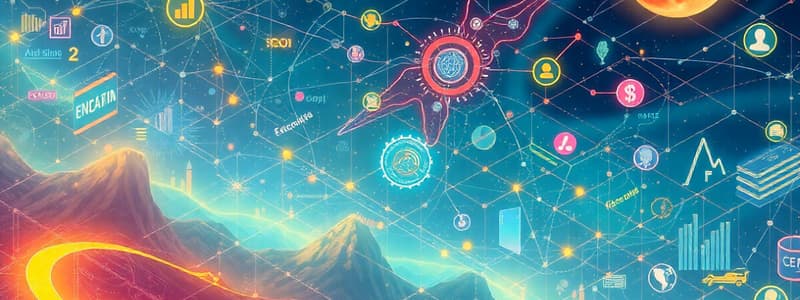Podcast
Questions and Answers
What is economics?
What is economics?
Economics is the study of how individuals and society manage their scarce resources.
What does scarcity refer to in economics?
What does scarcity refer to in economics?
Scarcity refers to the fact that people's wants are unlimited whereas the resources to satisfy them are limited.
What does microeconomics study?
What does microeconomics study?
Microeconomics is concerned with small parts of the economic system and explains the behavior of individuals and firms.
What does macroeconomics study?
What does macroeconomics study?
What is a mixed economic system?
What is a mixed economic system?
What is a command economy?
What is a command economy?
What are the main macroeconomic aims of government? (Select all that apply)
What are the main macroeconomic aims of government? (Select all that apply)
What do classical economists believe in regarding government intervention?
What do classical economists believe in regarding government intervention?
What does the Keynesian model promote?
What does the Keynesian model promote?
What are the four factors of production?
What are the four factors of production?
What is Gross Domestic Product (GDP)?
What is Gross Domestic Product (GDP)?
What is Gross National Product (GNP)?
What is Gross National Product (GNP)?
How do you calculate GNP?
How do you calculate GNP?
What was GNP at current market prices in 2023 if GDP was €509.9bn and Net Factor Income was €-121.9bn?
What was GNP at current market prices in 2023 if GDP was €509.9bn and Net Factor Income was €-121.9bn?
Why is net factor income from the rest of the world usually a negative figure for Ireland?
Why is net factor income from the rest of the world usually a negative figure for Ireland?
How to estimate nominal GDP per capita in 2023 given nominal GDP was €509,952m and the Irish population was 5.282m?
How to estimate nominal GDP per capita in 2023 given nominal GDP was €509,952m and the Irish population was 5.282m?
What is real GDP and how is it calculated?
What is real GDP and how is it calculated?
What was NNP at current market prices in 2023 if GNP was €388.0bn and Depreciation was €128.3bn?
What was NNP at current market prices in 2023 if GNP was €388.0bn and Depreciation was €128.3bn?
How to calculate real GDP growth for 2023 if GDP at constant market prices was €520.9bn in 2022 and €492.1bn in 2023?
How to calculate real GDP growth for 2023 if GDP at constant market prices was €520.9bn in 2022 and €492.1bn in 2023?
When is an economy classified to be in recession?
When is an economy classified to be in recession?
Flashcards are hidden until you start studying
Study Notes
Introduction to economics
- Economics studies how individuals and society manage scarce resources.
- Scarcity in economics means that people's wants are unlimited, but the resources to satisfy them are limited.
- Microeconomics focuses on individual behavior and firms in the economy.
- Macroeconomics studies the economy as a whole, analyzing determinants like total output, inflation, unemployment, national income, and economic growth.
- A mixed economic system combines government intervention with private enterprise.
- A command economy is where the government makes most economic decisions.
- Government macroeconomic objectives include economic growth (4%), low unemployment (4%), low inflation (2%), and long-term balance of public finances.
- Classical economists advocate for a laissez-faire economy emphasizing minimal government intervention.
- Keynesian economics promotes government intervention to stabilize the economy and minimize boom/bust cycles.
- The four factors of production are land, labor, capital, and enterprise.
- Corresponding payments for these factors are rent, wages, interest, and profit.
National Income
- Gross Domestic Product (GDP) measures the total value of goods and services produced within a country in a year, regardless of who produces them.
- GDP = Consumption (C) + Investment (I) + Government expenditure (G) + Exports (X) - Imports (M).
- Gross National Product (GNP) measures the total value of goods and services produced by a country's residents in a year, regardless of their location.
- GNP = GDP + Net Factor Income (F).
- Net Factor Income (F) includes payments from the rest of the world, like profit repatriation by foreign-owned companies.
- GDP per capita is calculated by dividing GDP by the population and is useful for international wealth comparisons.
- GDP deflator/inflator measures the inflation rate.
- Real GDP is calculated by dividing the nominal GDP by the GDP deflator.
- Net National Product (NNP) is GNP minus depreciation.
- Real GDP growth measures the percentage change in real GDP between periods.
- A recession is characterized by a decline in real GDP (negative growth).
Studying That Suits You
Use AI to generate personalized quizzes and flashcards to suit your learning preferences.




